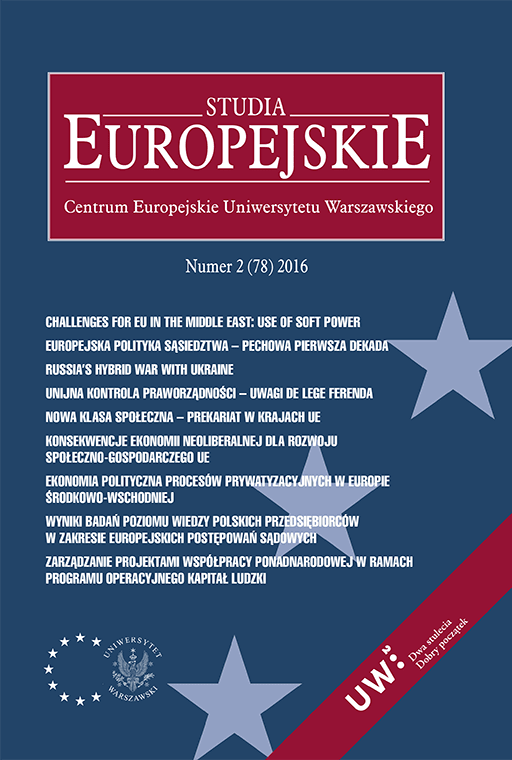
ISSUE: 2/2016
- Volume 78
- Number 2
- 2016
Subscribe NEWSLETTER
Studia Europejskie –
Studies in European Affairs
ISSN: 1428-149X
e-ISSN: 2719-3780
License
Articles published in the journal are under a Creative Commons Attribution – Non Commercial – No Derivatives 4.0 International License
Challenges for EU in the Middle East: Use of Soft Power
Abstract
In this paper, I will attempt to analyze the policies and strategies of the EU towards the Middle East in the context of using soft power. Two main issues need to be questioned in this framework: 1) Can EU use soft power instruments effectively in the Middle East? 2) Is EU’s choice to conduct soft power policy in the Middle East, able to make the EU a leading actor in world politics in terms of struggling with new threats in 21st Century? First of all, I will try to discuss “soft power”, as a concept very briefly. Afterwards, I will focus on the differences between the perspectives and approaches of the United States and the EU on the solutions of the problems in the Middle East. While analyzing EU’s use of soft power in the Middle East, I will not refer the general policies of the EU towards the region. Instead of this, I will focus on the Arab Spring and the significance of the recent movements in the region within the context of our subject. EU aims at creating peace and stability at its borders and prefers political and economic methods instead of military methods and hard power instruments. This paper examines how the EU uses this soft power instruments and what their consequences mean for the main issues in the Middle East. Besides, can this policy of the EU contribute to the solutions of the problems, stability and peace in the region? The answers of these questions are very significant within the context of EU’s approach to the Middle East, because of several reasons such as; course of the developments in the region, future success of European foreign and security policy and the role that EU is aiming for: ensuring its position as a global actor in world politics.
References
“A Secure Europe in a Better World, Brussels”, December 12, 2003, http://www.consilium.europa.eu/uedocs/cmsUpload/78367.pdf (last visited
4.2.2012).
Behr, T., Europe’s flawed Arab Spring: Is the EU really willing to support Arab democracy?, “FIIA Comment”, No. 5/2011, http://www.upi-fiia.fi/en/publication/178/ (last visited 4.02.2012).
Cooper, R., Hard Power, Soft Power and the Goals of Diplomacy, in: American Power in the 21st Century, David Held, Mathias Koenig-Archibugi
(eds.), UK and US, Polity Press, 2004, pp. 167–180.
“EU response to the Arab Spring: The SPRING Programme”, European Commission Development and Cooperation – Europe Aid, http://
europa.eu/rapid/press-release_MEMO-11-636_en.htm (last visited: 7.06.2015).
Kuzniar, R., Marching in step? EU, NATO and their respective attitudes to the use of force. Public Hearing: The EU and The Use of Force: Criteria for Intervention, European Parliament, Committee on Foreign Affairs, Subcommittee on Security and Defense, 23 February 2006, http://www.europarl.europa.eu/hearings/20060223/sede/kuzniar_en.pdf (last visited: 4.02.2012).
Michalski, A., The EU as a Soft Power: the Force of Persuasion, in: The New Public Diplomacy: Soft Power in International Relations, Jan Melissen
(ed.), Palgrave Macmillan, New York 2005, pp. 124–144.
Nye, J., Soft Power: the means to success in world politics, United States Public Affairs, 2004.
Schumacher, T., The EU and the Arab Spring: Between Spectatorship and Actorness, “Insight Turkey”, Vol. 13, No. 3/2011, pp. 107–119.
Language: English
Pages: 9-19
How to Cite:
Harvard
Erler Bayır, Ö. (2016) "Challenges for EU in the Middle East: Use of Soft Power". Studia Europejskie – Studies in European Affairs, 2/2016, pp. 9-19.